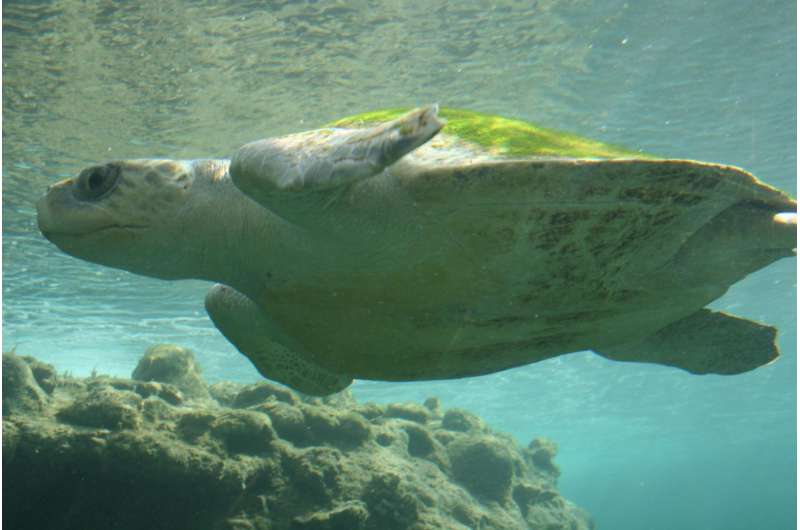February 8, 2017 report
Fear of sea turtle extinction due to female bias in warm climate unwarranted study suggests (Update)

(Phys.org)—A small team of researchers with members from Australia, Greece and the U.K. has found evidence that suggests the unlikelihood of quick extinction of sea turtles due to warming climate due to overlooked factors. In their paper published in the journal Proceedings of the Royal Society B, the team explains their findings and why they believe sea turtles will survive current ocean temperature rises.
Prior studies have shown that gender determination is not set by chromosomes in sea turtles, but is instead driven by the temperature of the sand in which eggs are laid. Colder nests result in more males, warmer nests more females. For this reason, ocean scientists have been worried that a warming climate would result in fewer males being born, driving sea turtles to extinction. In this new effort, the researchers suggest such theories have failed to consider two critical factors that they believe will prevent such extinctions.
The first factor is that newly hatched males tend to have a much higher survivability rate than females. The second factor is a higher number of females would lead to more offspring being born, since males have been found to mate twice as often on nesting beaches as females—every two years as compared to every four years. These factors, the researchers suggest, mean that population size will not be compromised, and in fact, there's a possibility of population increase. The researchers came to these conclusions after examining records of 75 sea turtle nesting sites (for seven species) at various places around the world over the past several years. They point out that population size for sea turtles has not dropped as some in the research community had feared.
The researchers conclude by noting that their predictions are based only on current nest rise temperatures—at some point, they note, extremely high incubation temperatures will most certainly result in unsustainable offspring mortality rates. Computer simulations have shown, for example, that at a nest temperature of 35° C, just five hatchlings would survive out of 100 eggs laid, the vast majority of which would, of course, be female.
More information: Graeme C. Hays et al. Population viability at extreme sex-ratio skews produced by temperature-dependent sex determination, Proceedings of the Royal Society B: Biological Sciences (2017). DOI: 10.1098/rspb.2016.2576
Abstract
For species with temperature-dependent sex determination (TSD) there is the fear that rising temperatures may lead to single-sex populations and population extinction. We show that for sea turtles, a major group exhibiting TSD, these concerns are currently unfounded but may become important under extreme climate warming scenarios. We show how highly female-biased sex ratios in developing eggs translate into much more balanced operational sex ratios so that adult male numbers in populations around the world are unlikely to be limiting. Rather than reducing population viability, female-biased offspring sex ratios may, to some extent, help population growth by increasing the number of breeding females and hence egg production. For rookeries across the world (n = 75 sites for seven species), we show that extreme female-biased hatchling sex ratios do not compromise population size and are the norm, with a tendency for populations to maximize the number of female hatchlings. Only at extremely high incubation temperature does high mortality within developing clutches threaten sea turtles. Our work shows how TSD itself is a robust strategy up to a point, but eventually high mortality and female-only hatchling production will cause extinction if incubation conditions warm considerably in the future.
Journal information: Proceedings of the Royal Society B
© 2017 Phys.org



















